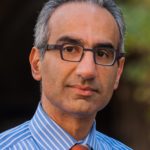PAP for All or PAP for Few: Controversies in Management of Sleep-Disordered Breathing (A6)
9:15-11:15 a.m., Sunday
Room C155-C156 (Level 1), KBHCCD
When it comes to choosing the most appropriate treatment for a patient with sleep-disordered breathing, clinicians must make controversial choices. For example, the evidence regarding the benefit of long-term continuous positive airway pressure (CPAP) therapy for asymptomatic patients is unclear. Similarly, there is debate among physicians about the best therapeutic approach for patients who have heart failure and central sleep apnea, as well as those who have obesity hypoventilation syndrome (OHS).

Babek Mokhlesi
These controversies will take center stage as a series of debates during Sunday morning’s session. Short, 10-minute presentations on the pros and cons of each controversy will allow thorough discussion of controversial topics. “We believe that the ATS attendees will be interested in hearing ongoing controversies in the field of sleep-disordered breathing,” said Babek Mokhlesi, MD, MSc, professor of medicine at the University of Chicago.
“These talks will highlight the latest data and will help provide a clinical perspective on what the important issues are to consider when managing sleep apnea patients with cardiovascular disease and obesity hypoventilation syndrome, and how the field should move forward with respect to future clinical trial design,” said Sushmita Pamidi, MD, assistant professor at McGill University in Montreal, Quebec, Canada.

Sushmita Pamidi
The first round of debate will focus on whether moderate to severe obstructive sleep apnea (OSA) should be treated in order to improve cardiovascular outcomes. Although observational studies have consistently reported an independent association between OSA and cardiovascular disease, more recent research raises questions.
“The largest randomized clinical trial to date, the SAVE trial, failed to demonstrate a statistically significant benefit from CPAP for recurrent CVD events,” says Neomi Shah, MD, MPH, MS, associate division chief at Icahn School of Medicine at Mount Sinai in New York City. A systematic review and meta-analysis reached a similar conclusion: The use of CPAP compared to no treatment or sham treatment didn’t demonstrate a lower risk of cardiovascular events or death in patients with sleep apnea. “This topic is important as we are in an urgent need to determine the role of OSA treatment in the primary and secondary prevention of cardiovascular disease events,” said Dr. Shah.

Neomi Shah
The second round of debate will consider the treatment of ambulatory patients with obesity hypoventilation syndrome. Should they be treated first with CPAP or with non-invasive ventilation? The same pro/con format will give attendees information supporting each treatment choice.
“When should one treatment modality be chosen over the other has remained a matter of controversy,” said Dr. Mokhlesi.
The presenters will explore the most recent published clinical trial on the treatment of OHS, co-authored by Dr. Mokhlesi, which aimed to compare the long-term effectiveness of treating OHS with non-invasive ventilation or CPAP. The researchers found that the two treatments have similar long-term results; however, given that the cost and complexity of CPAP is less than that of non-invasive ventilation, CPAP may be the most appropriate first treatment until more studies can be conducted.
The third area of controversy will be PAP therapy in patients with central sleep apnea and heart failure. “Since the results of the SERVE-HF trial have been published, the management of central sleep apnea in heart failure is not standardized and often requires a discussion among sleep providers to determine best management,” said Dr. Shah.
Dr. Pamidi agreed. “We expect attendees will be able to improve their understanding of the clinical trials to date, including the nuances of the study protocols and patient populations included in the studies, and see how this evidence applies to their clinical practice.”
